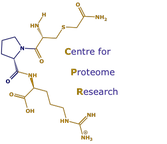From 2011, we have offered a proteomics service as a Shared Research Facility under the auspices (and with the support of) the Faculty’s Technology Directorate. This means that we are very willing to work with other research groups who need (often transient) access to advanced protein mass spectrometry or proteomics, to help them attain their own goals.
Some recent case studies will serve to illustrate the breadth of our involvement
Case Study 1
CSF biomarkers in acute bacterial meningitis
Colleagues wished to complete a quantitative proteomics study on cerebrospinal fluid samples. These samples were potentially infective, and we worked with them to perform appropriate bacteriological tests to prove that our protocols were effective at complete sterilisation of the samples.
Once this was established, the samples were received by us (from a Category 3 facility) and run on our instrumentation.
This work led to the identification of a panel of proteins that could potentially be used as diagnostic biomarkers, and a patent for these markers has been filed (2016).
CSF biomarkers in acute bacterial meningitis
Colleagues wished to complete a quantitative proteomics study on cerebrospinal fluid samples. These samples were potentially infective, and we worked with them to perform appropriate bacteriological tests to prove that our protocols were effective at complete sterilisation of the samples.
Once this was established, the samples were received by us (from a Category 3 facility) and run on our instrumentation.
This work led to the identification of a panel of proteins that could potentially be used as diagnostic biomarkers, and a patent for these markers has been filed (2016).
Case Study 4
A senior postdoc/research fellow wished to gain experience in proteomics, and has become embedded in the group according to our 'subscription; model. We give this individual sufficient training in principles and practice of quantitative mass spectrometry that they were able to run samples independently and analyse their own samples. [Paper 1]
A senior postdoc/research fellow wished to gain experience in proteomics, and has become embedded in the group according to our 'subscription; model. We give this individual sufficient training in principles and practice of quantitative mass spectrometry that they were able to run samples independently and analyse their own samples. [Paper 1]
Case Study 5
A senior postdoc/research fellow wished to gain experience in proteomics, and has become embedded in the group according to our 'subscription; model. We give this individual sufficient training in principles and practice of quantitative mass spectrometry that they are able to run samples independently and analyse their own samples.
A senior postdoc/research fellow wished to gain experience in proteomics, and has become embedded in the group according to our 'subscription; model. We give this individual sufficient training in principles and practice of quantitative mass spectrometry that they are able to run samples independently and analyse their own samples.
Case Study 2
Analysis of acute phase proteins in domsiticated animals
A group in Aarhus wished to develop a quantitative assay for a panel of acute phase proteins in domesticated animals. We helped them design a QconCAT, built the gene for them, expressed the protein in unlabelled an stable isotope labelled form, and helped them develop appropriate high sensitivity assays. [Paper 1][Paper 2][Paper 3]
Analysis of acute phase proteins in domsiticated animals
A group in Aarhus wished to develop a quantitative assay for a panel of acute phase proteins in domesticated animals. We helped them design a QconCAT, built the gene for them, expressed the protein in unlabelled an stable isotope labelled form, and helped them develop appropriate high sensitivity assays. [Paper 1][Paper 2][Paper 3]
Case Study 3
We worked with a group in the University who were interested in analysing the secreted proteomes of cells derived from uveal melanoma, a cancer of the eye. In this study the investigators cultured the cel and with help from us, devised methods to capture the secretome very efficiently. From this study, the investigators were able to identify the relationship between protein expression and progression. [Paper 1]
We worked with a group in the University who were interested in analysing the secreted proteomes of cells derived from uveal melanoma, a cancer of the eye. In this study the investigators cultured the cel and with help from us, devised methods to capture the secretome very efficiently. From this study, the investigators were able to identify the relationship between protein expression and progression. [Paper 1]
